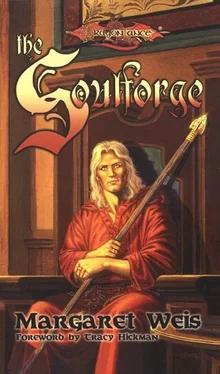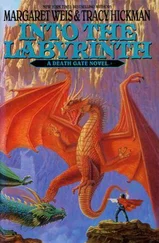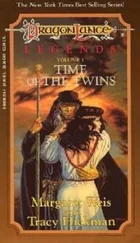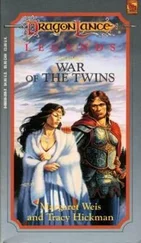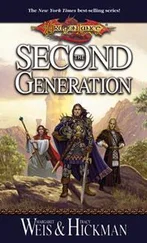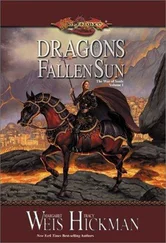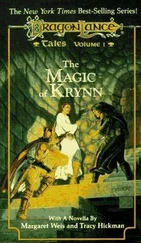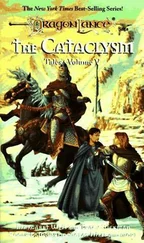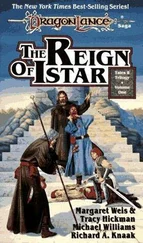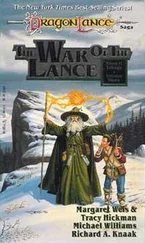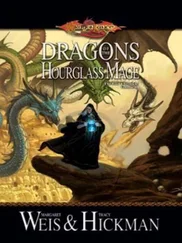He was silent a moment, then said, "There are no spellbooks, are there?"
"No," replied the old man, "there is only me."
"And who are you?" Raistlin asked.
"My name is not important. Not yet."
"Well, then, what do you want of me?"
The old man made a deprecating gesture with the gnarled and knotted hand. "A little favor, nothing more."
Now it was Raistlin who smiled, and his smile was bitter. "Excuse me, sir, but you must be aware that since I am taking the Test, I am of very low ranking. You appear to be-or have been-a wizard of immense skill and power. I have nothing that you could possibly want."
"Ah, but you do!" The old man's eyes gleamed with a hungry, devouring light, a flame that made the candle's flame dim and feeble by contrast. "You live!"
"For the time being," Raistlin said dryly. "Perhaps not much longer. The dark elves will not believe me when I tell them there are no ancient spellbooks down here. They will think that I have magically spirited them away for my own use." He glanced around. "I don't suppose there is any way to escape from this cellar."
"There is a way-my way," said the old man. "My way is the only way. You are quite right, the dark elves will kill you. They're not thieves as they pretend, you know. They are high-ranking wizards. Their magic is exceptionally powerful."
Raistlin should have recognized that at once.
"Not giving up, are you?" the old man asked with a sneer.
"I am not." Raistlin lifted his head, gazed steadily at the old man. "I was thinking."
"Think away, young magus. You're going to have to think hard to overcome three-to-one odds. Make that twelve-to-one, since each dark elf is four times as powerful as yourself."
"This is the Test," Raistlin said. "It is all illusion. Admittedly some magi die taking the Test, but that is through their own failure or inadvertence. I have done nothing wrong. Why should the conclave kill me?"
"You have talked to me," the old man said softly. "They are aware of that, and that may well prove your downfall."
"Who are you, then," Raistlin asked impatiently, "that they fear you so?" "My name is Fistandantilus. Perhaps you've heard of me." "Yes," said Raistlin.
Long ago, in the turbulent and desperate years following the Cataclysm, an army of hill dwarves and humans laid siege to Thorbardin, the great underground city of the mountain dwarves. Leading this army, instrumental in its formation, intending to use the army to achieve his own driving ambition, was a wizard of the Black Robes, a wizard of immense power, a renegade wizard openly defying the conclave. His name was Fistandantilus.
He built a magical fortress known as Zhaman and from there launched his attack against the dwarven stronghold.
Fistandantilus fought the dwarves with his magic, his armies fought with ax and sword. Many thousands died on the plains or in the mountain passes, but the wizard's army faltered. And the dwarves of Thorbardin claimed victory.
According to the minstrels, Fistandantilus plotted one last spell, a spell of catastrophic power that would split the mountain, lay Thorbardin open to conquest. Unfortunately the spell was too powerful. Fistandantilus could not control it. The spell shattered the fortress of Zhaman. It collapsed in upon itself and was now known as Skullcap. Thousands of his own army died in the blast, including the wizard who had cast it.
That is what the minstrels sang, and that is what most people believed. Raistlin had always imagined there was more to the story than that. Fistandantilus had gained his power over hundreds of years. He was not elven, but human. He had, so it was rumored, found a way to cheat death. He extended his life by murdering his young apprentices, drawing out their life-force by means of a magical bloodstone. He had not been able to survive the shattering effects of his own magic, however. At least, that's what the world supposed. Evidently Fistandantilus had once again cheated death. Yet he would not do so for long.
"Fistandantilus-the greatest of all magi," Raistlin said. "The most powerful wizard who has ever lived."
"I am," said Fistandantilus.
"And you are dying," Raistlin observed.
The old man did not like this. His brows contracted, the lines of his face drew together in a dagger point of anger, his outrage bubbled beneath the surface. But every breath was a struggle. He was expending an enormous amount of magical energy merely to hold this form together. The fury ceased to boil, a pot under which the fire was put out.
"You speak the truth. I am dying," he muttered, frustrated, impotent. "I am nearly finished. They tell you that my goal was to take over Thorbardin." He smiled disdainfully. "What rot! I played for far greater stakes than the acquisition of some stinking, filthy dwarven hole in the ground. My plan was to enter the Abyss. To overthrow the Dark Queen, remove Takhisis from her throne. I sought godhood!"
Raistlin was awed listening to this, awed and amazed. Awed, amazed, and sympathetic.
"Beneath Skullcap is. or shall we say was, for it is gone now"-Fistandantilus paused, looked extremely cunning-"a means of entering the Abyss, that cruel netherworld. Takhisis was aware of me. She feared me and plotted my downfall. True, my body died in the blast, but I had already planned my soul's retreat on another plane of existence. Takhisis could not slay me, for she could not reach me, but she never ceases to try. I am under constant assault and have been for centuries. I have little energy left. The life-force I carried with me is almost gone."
"And so you contrive to enter the Test and lure young mages like me into your web," said Raistlin. "I would guess that I am not the first. What has happened to those who came before me?"
Fistandantilus shrugged. "They died. I told you. They spoke to me. The conclave fears that I will enter into the body of a young mage, take him over and so return to the world to complete what I began. They cannot allow that, and so each time they see to it that the threat is eliminated."
Raistlin gazed steadily at the old man, the dying old man. "I don't believe you. The mages died, but it was not the conclave who killed them. It was you. That is how you've managed to live for so long -if you call it living."
"Call it what you will, it is preferable to the great nothingness I see reaching out for me," Fistandantilus said with a hideous grin. "The same nothingness that is reaching out for you, young mage."
"I have little choice, it seems," Raistlin replied bitterly. "Either I die at the hands of three wizards or I am to be sucked dry by a lich."
"It was your decision to come down here," Fistandantilus replied.
Raistlin lowered his gaze, refused to allow the old man's probing hawk eyes to gain admittance to his soul. He stared at the wooden table and was reminded of the table in his master's laboratory, the table on which the child Raistlin had written, so triumphantly, I, Magus. He considered the odds he faced, thought about the dark elves, wondered at their magic, wondered if what the old man had said about them was true or if it was all lies, lies intended to trap him. He wondered about his own ability to survive, wondered if the conclave would kill him simply because he had spoken to Fistandantilus.
Raistlin lifted his gaze, met the hawk eyes. "I accept your offer."
Fistandantilus's thin lips parted in a smile that was like the grin of a skull. "I thought you might. Show me your spellbook."
Raistlin stood at the bottom of the cellar stairs, waiting for the old man to release the trapdoor from the enchantment that held it shut. He wondered that he felt no fear, only the razor-edged pain of anticipation.
The elves had halted their assault on the cellar doors; they had figured out that magic held them. He allowed himself the hope that perhaps they had gone. The next moment he laughed at himself for his foolishness. This was his Test. He would be required to prove his ability to use magic in battle.
Читать дальше
